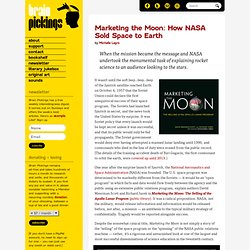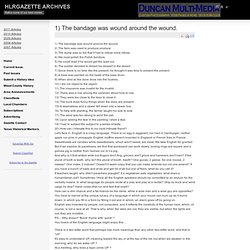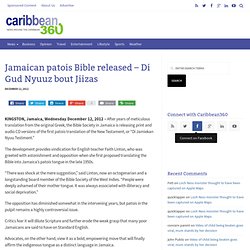

Marketing the Moon: How NASA Sold Space to Earth. By Michelle Legro When the mission became the message and NASA undertook the monumental task of explaining rocket science to an audience looking to the stars.

It wasn’t until the soft beep…beep…beep of the Sputnik satellite reached Earth on October 4, 1957 that the Soviet Union could declare the first unequivocal success of their space program. The Soviets had launched Sputnik in secret, and the news took the United States by surprise. It was Soviet policy that every launch would be kept secret unless it was successful, and that its public would only be fed propaganda. The Soviet government would deny ever having attempted a manned lunar landing until 1990, and cosmonauts who died in the line of duty were erased from the public record. One year after the surprise launch of Sputnik, the National Aeronautics and Space Administration (NASA) was founded. Reporters at Cape Canaveral during the launch of one of the Mercury missions Dick Cavett interviews the Apollo 15 astronauts, 1971. 1) The bandage was wound around the wound.
There is a two-letter word that perhaps has more meanings than any other two-letter word, and that is ‘UP.' It's easy to understand UP, meaning toward the sky or at the top of the list, but when we awaken in the morning, why do we wake UP ?

At a meeting, why does a topic come UP ? Why do we speak UP and why are the officers UP for election and why is it UP to the secretary to write UP a report ? We call UP our friends.And we use it to brighten UP a room, polish UP the silver; we warm UP the leftovers and clean UP the kitchen.We lock UP the house and some guys fix UP the old car. At other times the little word has real special meaning. Inventing_language_belching_cave_392985.jpg 500×357 pixels. Language and brain. What is language? Jamaican patois Bible released – Di Gud Nyuuz bout Jiizas. KINGSTON, Jamaica, Wednesday December 12, 2012 – After years of meticulous translation from the original Greek, the Bible Society in Jamaica is releasing print and audio CD versions of the first patois translation of the New Testament, or “Di Jamiekan Nyuu Testiment.”

The development provides vindication for English teacher Faith Linton, who was greeted with astonishment and opposition when she first proposed translating the Bible into Jamaica’s patois tongue in the late 1950s. “There was shock at the mere suggestion,” said Linton, now an octogenarian and a longstanding board member of the Bible Society of the West Indies. “People were deeply ashamed of their mother tongue. It was always associated with illiteracy and social deprivation.” The opposition has diminished somewhat in the intervening years, but patois in the pulpit remains a highly controversial issue. “We’ve now produced a major body of literature in the language, whatever people may think about it one way or the other.
The 13 Most Common Gestures You'll See Daily. Chapter 11 People rarely think consciously about the effect of many of the seemingly simple non-verbal things they do.

For example, when one person hugs another, most observers silently assume that the back patting that occurs towards the end of the hug is a gesture of affection and that the air kisses made - the sound made on the side of someone's cheek - is also affection. The reality is that the pat is used in the same way professional wrestlers use it - to tell the other person to end the hug and break the clinch.
If you are really not too keen about hugging someone but are forced into it because the people ahead of you did it, you're likely to begin the back patting in the air even before the hug begins. The air kiss - with its accompanying sound - is given as a displacement of a real kiss that we don't want to give either. This chapter covers some of the most common head gestures and body language clusters you are likely to see in your day-to-day dealings with others.